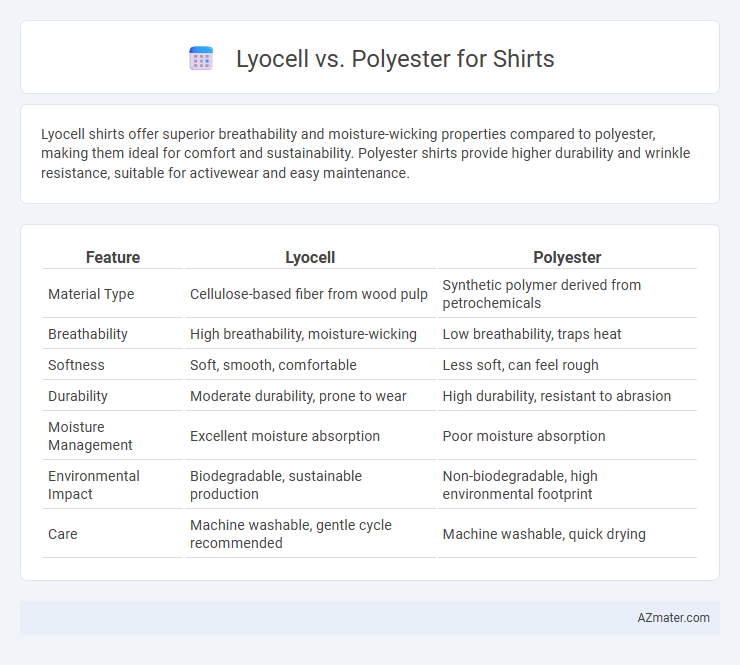Lyocell shirts offer superior breathability and moisture-wicking properties compared to polyester, making them ideal for comfort and sustainability. Polyester shirts provide higher durability and wrinkle resistance, suitable for activewear and easy maintenance.
Table of Comparison
| Feature | Lyocell | Polyester |
|---|---|---|
| Material Type | Cellulose-based fiber from wood pulp | Synthetic polymer derived from petrochemicals |
| Breathability | High breathability, moisture-wicking | Low breathability, traps heat |
| Softness | Soft, smooth, comfortable | Less soft, can feel rough |
| Durability | Moderate durability, prone to wear | High durability, resistant to abrasion |
| Moisture Management | Excellent moisture absorption | Poor moisture absorption |
| Environmental Impact | Biodegradable, sustainable production | Non-biodegradable, high environmental footprint |
| Care | Machine washable, gentle cycle recommended | Machine washable, quick drying |
Introduction to Lyocell and Polyester Shirts
Lyocell shirts, crafted from sustainably sourced wood pulp, offer exceptional breathability, moisture-wicking properties, and a soft, smooth texture ideal for sensitive skin. Polyester shirts, made from synthetic polymers, excel in durability, wrinkle resistance, and quick-drying performance, making them popular for activewear and everyday use. Choosing between lyocell and polyester depends on preferences for natural fiber comfort versus synthetic fabric resilience and maintenance.
Fabric Composition and Manufacturing Process
Lyocell fabric is made from sustainably harvested wood pulp, primarily eucalyptus, processed through a closed-loop system that recycles water and solvents, minimizing environmental impact. Polyester, a synthetic fiber derived from petroleum, is produced through a chemical polymerization process that is energy-intensive and involves non-renewable resources. The natural cellulose base of Lyocell results in breathable, moisture-wicking fabric, while polyester offers durability and wrinkle resistance due to its synthetic polymer structure.
Environmental Impact: Lyocell vs Polyester
Lyocell is derived from sustainably sourced wood pulp and produced through a closed-loop process that recycles water and solvents, significantly reducing its environmental footprint compared to polyester. Polyester is made from petroleum-based synthetic fibers, contributing to fossil fuel depletion and microplastic pollution in oceans during washing. Lyocell's biodegradable nature contrasts with polyester's persistence in landfills, making Lyocell a more eco-friendly choice for sustainable shirt production.
Breathability and Moisture Management
Lyocell shirts offer superior breathability due to their natural cellulose fibers, allowing enhanced airflow and moisture-wicking properties that keep the skin dry and comfortable. Polyester, a synthetic fiber, tends to trap heat and moisture, resulting in less effective breathability and slower moisture evaporation. Lyocell's eco-friendly production and moisture management make it a preferred choice for activewear and hot climates compared to polyester.
Comfort and Texture Comparison
Lyocell shirts offer superior comfort due to their natural moisture-wicking properties and breathability, making them soft and gentle on the skin. In contrast, polyester shirts tend to retain heat and moisture, which can cause discomfort and a clammy feeling during extended wear. The texture of Lyocell is smooth and silky, resembling natural fibers, whereas polyester has a synthetic, slightly rougher feel that may lead to irritation for sensitive skin.
Durability and Longevity of Fabrics
Lyocell offers excellent durability with strong fiber structure that resists wear and tear while maintaining softness, making it ideal for shirts requiring long-lasting comfort. Polyester excels in longevity due to its synthetic composition, providing superior resistance to shrinking, stretching, and fading over multiple washes. Both fabrics ensure durable shirts, but polyester typically outperforms Lyocell in retaining shape and color after prolonged use.
Care and Maintenance Requirements
Lyocell shirts require gentle machine washing with mild detergent and air drying to maintain their softness and prevent shrinkage, while polyester shirts are more durable and can withstand regular machine washing and tumble drying without significant wear. Lyocell's moisture-wicking properties demand careful care to avoid fabric damage, whereas polyester's synthetic fibers resist wrinkles and stains, reducing the need for frequent ironing. Proper care extends the lifespan of lyocell by preserving its natural fibers, but polyester's low-maintenance nature offers convenience for everyday use.
Cost Analysis: Which Is More Affordable?
Lyocell shirts generally have a higher production cost due to sustainable sourcing and eco-friendly manufacturing processes, resulting in a higher retail price compared to polyester shirts. Polyester, being a synthetic fiber derived from petroleum, is produced at a lower cost and is widely available, making it the more affordable option for budget-conscious consumers. However, the long-term value of Lyocell may offset initial costs due to its durability and moisture-wicking properties.
Style and Versatility in Fashion
Lyocell shirts offer a luxurious, breathable fabric that drapes elegantly, creating a sophisticated style ideal for both casual and formal occasions. Polyester shirts provide durability and wrinkle resistance, maintaining vibrant colors and shapes suited for everyday wear and active lifestyles. The versatility of Lyocell enhances eco-conscious fashion choices, while polyester delivers reliable performance in a wide range of styles and environments.
Which Fabric is Best for Shirts?
Lyocell offers superior breathability, moisture-wicking, and softness compared to polyester, making it ideal for comfortable, all-day wear in shirts. Polyester is more durable, wrinkle-resistant, and cost-effective but lacks the natural feel and eco-friendliness of lyocell. For those prioritizing comfort and sustainability, lyocell is the best choice, whereas polyester suits budget-conscious or high-performance needs.

Infographic: Lyocell vs Polyester for Shirt
 azmater.com
azmater.com